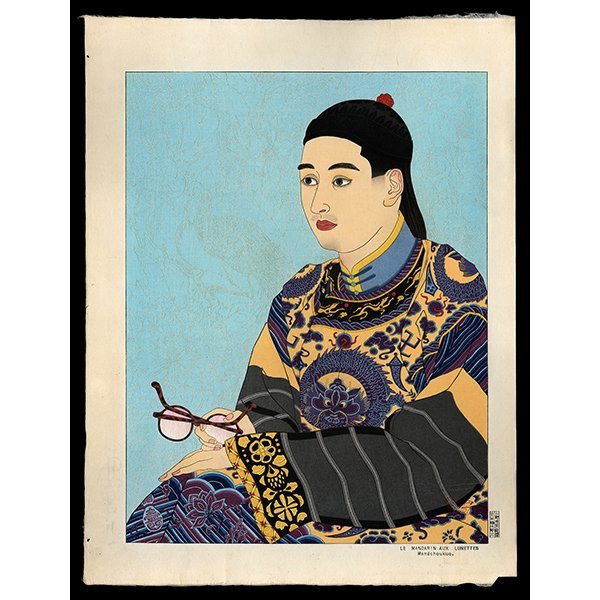<b>LA GEISHA KIYOKA</b> / Paul Jacoulet1935<b>SOLD</b></em>
ARTIST: Paul Jacoulet (1896-1960)
TITLE: La Geisha Kiyoka
EDITION: Kanji Edition, 90/150
MEDIUM: Woodblock
DATE: 1935
DIMENSIONS: 18 1/2 x 14 3/4 inches
CONDITION: Tape remnants on reverse
LITERATURE: Miles, Richard, Prints of Paul Jacoulet, pl. 19
NOTE: Silver mica background
SOLD
ARTIST: Paul Jacoulet (1896-1960)
TITLE: La Geisha Kiyoka
EDITION: Kanji Edition, 90/150
MEDIUM: Woodblock
DATE: 1935
DIMENSIONS: 18 1/2 x 14 3/4 inches
CONDITION: Tape remnants on reverse
LITERATURE: Miles, Richard, Prints of Paul Jacoulet, pl. 19
NOTE: Silver mica background
SOLD
ARTIST: Paul Jacoulet (1896-1960)
TITLE: La Geisha Kiyoka
EDITION: Kanji Edition, 90/150
MEDIUM: Woodblock
DATE: 1935
DIMENSIONS: 18 1/2 x 14 3/4 inches
CONDITION: Tape remnants on reverse
LITERATURE: Miles, Richard, Prints of Paul Jacoulet, pl. 19
NOTE: Silver mica background
SOLD
Details
The Frenchman, Paul Jacoulet, in this charming print presents us with a Geisha adorned in her finest, with well-coiffed hair and a stunning kimono assemble embellished with intricate mon patterns, most likely the traditional crest of her particular tea-house, and an elaborately decorated obi belt with an autumnal pattern suggesting the season. She sits in repose, studying a woodblock print that amusingly is another Jacoulet design.
The impression’s quality is what one would expect from Jacoulet, who was known for an unrivaled superiority in printing effects. This particular design showcases that skill in the soft glow around the Geisha’s face, the delicate silver mica background, and the accurate rendering of the Jacoulet print in miniature within the design.
Connoisseur's Note
Jacoulet is known to have employed elaborate and experimental printing techniques and materials. Many of his most complicated designs required fifty to seventy printing stages; well over one hundred were utilized in some cases. The artist was involved in every facet of production and self-published most of his work, selling them by way of subscription. To maintain commercial viability, Jacoulet would only print enough to fill existing subscription orders and often printed far less than the proposed edition number would suggest. This impression is part of the Kanji edition, numbered 90/150 on the verso, with the hand-applied label with the print’s title on the front bottom margin, making it the earliest and most desirable version available.








